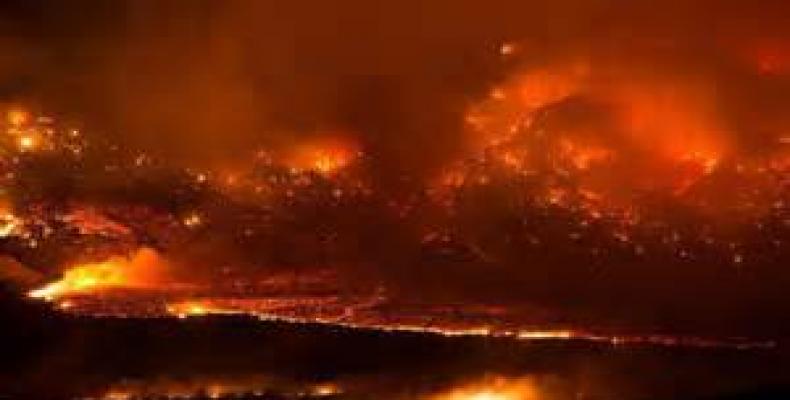San Francisco, August 5 (RHC)-- Thousands of firefighters in the U.S. state of California are working round the clock to contain a massive wildfire threatening numerous homes and forcing thousands of people to evacuate.
The raging fire grew to more than 101 square miles (262 square km) on Tuesday as it burned through drought-withered brush in the Lower Lake area about 100 miles (1691 km) north of San Francisco.
More than 3,000 firefighters, backed by helicopters and tankers, tried to stand their ground against the blaze, which has caught firefighters off guard and shocked residents by its rapid growth.
Nearly a week into the fight, exhaustion has overwhelmed fire crews, leading to a rotation of resources from in and out of the state.
Over 13,000 residents have been forced from their homes or warned to leave since the blaze ignited Wednesday, according to Battalion Chief Carl Schwettmann of the California Department of Forestry and Fire Protection.
"There were too many (spot fires) for us to pick up," Schwettmann told the San Francisco Chronicle. "With these drought-stricken fuels, it's just moving at an extremely high rate of speed."
"There's a lot of old growth-type vegetation and four years of drought to dry it all out," said Lynne Tolmachoff, a spokeswoman for the California Department of Forestry and Fire Protection. "It was ready to go."
California’s four-year drought has already cost the state billions of dollars and placed thousands of jobs at risk. More than 12 million trees in California forests have died and more are expected to do so soon, according to a Forest Service report.
Scientists say the drought-stricken U.S. West Coast has the potential to strengthen wildfires that could destroy homes, affect watersheds and cost hundreds of millions of dollars to extinguish during the warm summer months.
“We are seeing wildfires in the United States grow to sizes that were unimaginable just 20 or 30 years ago,” U.S. Forest Service Chief Tom Tidwell told Congress in May. “We expect 2015 to continue the trend of above average fire activity.”


